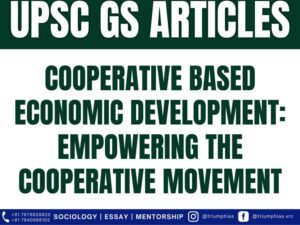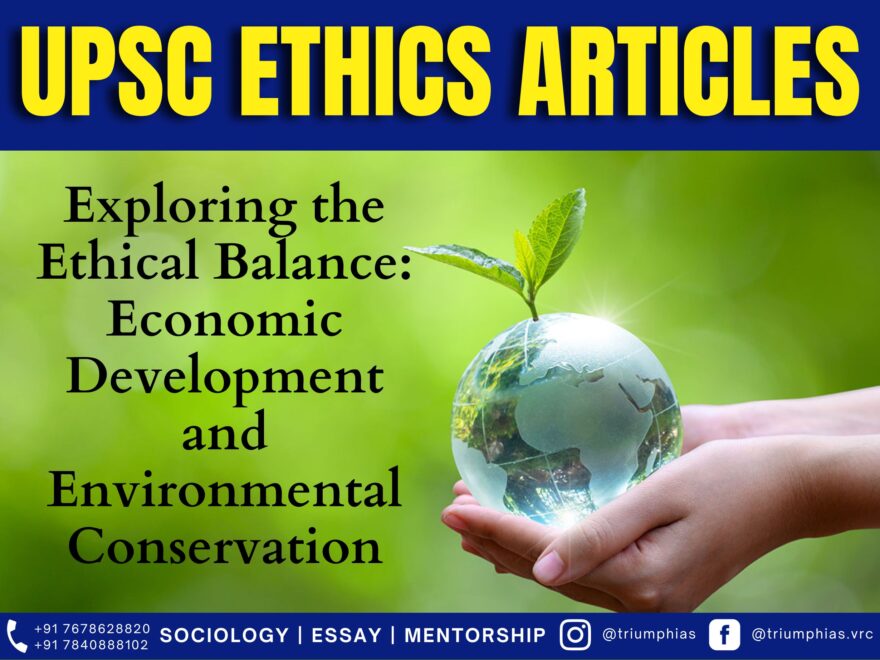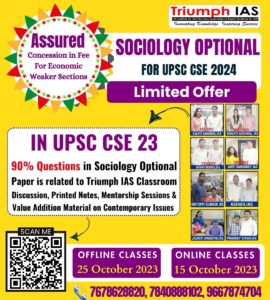Exploring the Ethical Balance: Economic Development and Environmental Conservation.
Relevant for Public Ethics, Integrity and Aptitude.

Economic development Vs environmental conservation: An ethical dilemma.
Balancing economic development with environmental conservation presents a challenging ethical quandary. While economic progress is crucial for societal advancement, it frequently entails adverse effects on the environment. Overlooking the environmental repercussions of economic development may result in enduring detrimental impacts on both the environment and the well-being of present and future generations.
What is environmental ethics?
Environmental ethics can be broadly categorized into three approaches:
Examples of Environmental Ethics:
|
Significance of Exploring Environmental Ethics:
|
- Environmental ethics plays a vital role in comprehending the ethical duties and responsibilities humans have towards the environment. It offers a structured approach to decision-making on environmental matters. Deforestation stands out as a significant environmental challenge in India, giving rise to various ethical issues such as biodiversity loss, contributions to climate change, and the displacement of indigenous communities. Addressing these ethical concerns and striking a balance between development and conservation is imperative for ensuring a sustainable future for all.
- Environmental degradation occurs when the focus is solely on economic development, leading to the exploitation of natural resources, pollution, deforestation, and habitat destruction.
- Intergenerational equity is compromised when economic development takes precedence without considering its long-term impact on the environment. This approach may result in an unfair distribution of resources between current and future generations. Future generations have the right to inherit a healthy and sustainable planet, and prioritizing short-term economic gains at the expense of the environment raises questions about intergenerational justice.
- Environmental justice comes into play as environmental degradation disproportionately affects marginalized communities and vulnerable populations. These groups often bear the brunt of the negative consequences, such as pollution and resource depletion.
- Long-term economic viability is jeopardized when environmental concerns are neglected. Ignoring environmental conservation can lead to resource depletion, ecological imbalances, and increased vulnerability to natural disasters, ultimately threatening economic stability and development.
Prioritizing economic development at the expense of environmental conservation raises numerous ethical dilemmas that warrant thoughtful consideration. Striking a balance between economic growth and environmental protection is essential to guarantee sustainable development and a future that is just and equitable for all. Governments and corporations bear a responsibility to safeguard the environment and foster sustainable development that serves the well-being of both present and future generations.
(Reference: Static portion)
Frequently Asked Questions:
1. Question: Define the concept of environmental ethics in the context of economic development.
Answer: Environmental ethics pertain to the moral relationships and obligations between humans and the environment, focusing on the ethical aspects and implications of human actions upon the ecosystem, particularly within the spectrum of economic development.
2. Question: Highlight the three distinct approaches within environmental ethics.
Answer: The three approaches in environmental ethics are Anthropocentric (human-centered ethics), Bio-centered (emphasizing moral responsibility towards future generations and all beings), and Eco-centric (valuing and respecting the entire ecosystem and all living beings within it).
3. Question: Provide an instance where environmental ethics played a role in policy-making in India.
Answer: An example is the implementation of CNG usage in vehicles in Delhi and NCR to combat industrial pollution, backed by the “Green Fuel Clean Fuel” campaign, reflecting a commitment to uphold environmental ethics through policy-making and initiatives.
4. Question: Why is the exploration of environmental ethics crucial?
Answer: Investigating environmental ethics is pivotal to understanding our moral obligations towards the environment, ensuring balanced development that doesn’t compromise the needs of future generations, and guiding informed, sustainable decision-making in areas like resource management and environmental policy.
5. Question: Explain the ethical dilemma related to economic development vs. environmental conservation.
Answer: The ethical dilemma involves striking a balance between facilitating economic progress and safeguarding the environment. Undue emphasis on economic development can lead to environmental degradation, jeopardizing resources for future generations, and potentially leading to socio-economic disparities and environmental injustice.
6. Question: How does environmental degradation raise concerns regarding intergenerational equity?
Answer: Environmental degradation, often a byproduct of unchecked economic development, raises intergenerational equity concerns by risking the depletion and compromise of environmental and natural resources, potentially leaving future generations with diminished resources and compromised living conditions.
7. Question: How does the concept of environmental justice relate to economic development and environmental conservation?
Answer: Environmental justice involves ensuring that all social and economic groups benefit equitably from environmental conservation and bear a fair share of the burdens related to environmental degradation. In the context of economic development, it emphasizes that advancement should not disproportionately impact vulnerable and marginalized communities negatively.
8. Question: Elucidate the impact of neglecting environmental conservation on long-term economic viability.
Answer: Neglecting environmental conservation in the pursuit of economic development can lead to resource depletion, ecological imbalance, and enhanced susceptibility to natural calamities, all of which can eventually pose threats to long-term economic stability and growth.
Related Blogs …
 |
 |
To master these intricacies and fare well in the Sociology Optional Syllabus, aspiring sociologists might benefit from guidance by the Best Sociology Optional Teacher and participation in the Best Sociology Optional Coaching. These avenues provide comprehensive assistance, ensuring a solid understanding of sociology’s diverse methodologies and techniques.
META TAGS:
Economic Development, Environmental Conservation, Ethical Dilemma, Environmental Ethics, Anthropocentric Approach, Bio-centered Approach, Eco-centric Approach, Sustainable Development, Intergenerational Equity, Environmental Justice, Biodiversity, Deforestation, Narmada Bachao Andolan, Chipko Movement, MC Mehta v. Union of India, CNG Usage, Green Fuel Clean Fuel, Valley Project, Narmada Dam, Tehri Dam, Taj Mahal Conservation, Balanced Development, Informed Decision-Making, Resource Management, Land Use Planning, Environmental Policy, Vulnerable Populations, Future Generations, Ethical Responsibilities, Natural Habitats, Environmental Degradation, Pollution.

Choose The Best Sociology Optional Teacher for IAS Preparation?
At the beginning of the journey for Civil Services Examination preparation, many students face a pivotal decision – selecting their optional subject. Questions such as “which optional subject is the best?” and “which optional subject is the most scoring?” frequently come to mind. Choosing the right optional subject, like choosing the best sociology optional teacher, is a subjective yet vital step that requires a thoughtful decision based on facts. A misstep in this crucial decision can indeed prove disastrous.
Ever since the exam pattern was revamped in 2013, the UPSC has eliminated the need for a second optional subject. Now, candidates have to choose only one optional subject for the UPSC Mains, which has two papers of 250 marks each. One of the compelling choices for many has been the sociology optional. However, it’s strongly advised to decide on your optional subject for mains well ahead of time to get sufficient time to complete the syllabus. After all, most students score similarly in General Studies Papers; it’s the score in the optional subject & essay that contributes significantly to the final selection.
“A sound strategy does not rely solely on the popular
Opinion of toppers or famous YouTubers cum teachers.”
It requires understanding one’s ability, interest, and the relevance of the subject, not just for the exam but also for life in general. Hence, when selecting the best sociology teacher, one must consider the usefulness of sociology optional coaching in General Studies, Essay, and Personality Test.
The choice of the optional subject should be based on objective criteria, such as the nature, scope, and size of the syllabus, uniformity and stability in the question pattern, relevance of the syllabic content in daily life in society, and the availability of study material and guidance. For example, choosing the best sociology optional coaching can ensure access to top-quality study materials and experienced teachers. Always remember, the approach of the UPSC optional subject differs from your academic studies of subjects. Therefore, before settling for sociology optional, you need to analyze the syllabus, previous years’ pattern, subject requirements (be it ideal, visionary, numerical, conceptual theoretical), and your comfort level with the subject.
This decision marks a critical point in your UPSC – CSE journey, potentially determining your success in a career in IAS/Civil Services. Therefore, it’s crucial to choose wisely, whether it’s the optional subject or the best sociology optional teacher. Always base your decision on accurate facts, and never let your emotional biases guide your choices. After all, the search for the best sociology optional coaching is about finding the perfect fit for your unique academic needs and aspirations.
To master these intricacies and fare well in the Sociology Optional Syllabus, aspiring sociologists might benefit from guidance by the Best Sociology Optional Teacher and participation in the Best Sociology Optional Coaching. These avenues provide comprehensive assistance, ensuring a solid understanding of sociology’s diverse methodologies and techniques. Sociology, Social theory, Best Sociology Optional Teacher, Best Sociology Optional Coaching, Sociology Optional Syllabus.
Best Sociology Optional Teacher, Sociology Syllabus, Sociology Optional, Sociology Optional Coaching, Best Sociology Optional Coaching, Best Sociology Teacher, Sociology Course, Sociology Teacher, Sociology Foundation, Sociology Foundation Course, Sociology Optional UPSC, Sociology for IAS,
Follow us :
🔎 https://www.instagram.com/triumphias
🔎 https://www.youtube.com/c/TriumphIAS
🔎 https://t.me/VikashRanjanSociology
Find More Blogs…
| Compare and contrast Karl Marx’s and Max weber’s | Karl Marx- Historical Materialism |
| Position of Women In the Modern Indian Society | Sociology: Social system and pattern variables |



